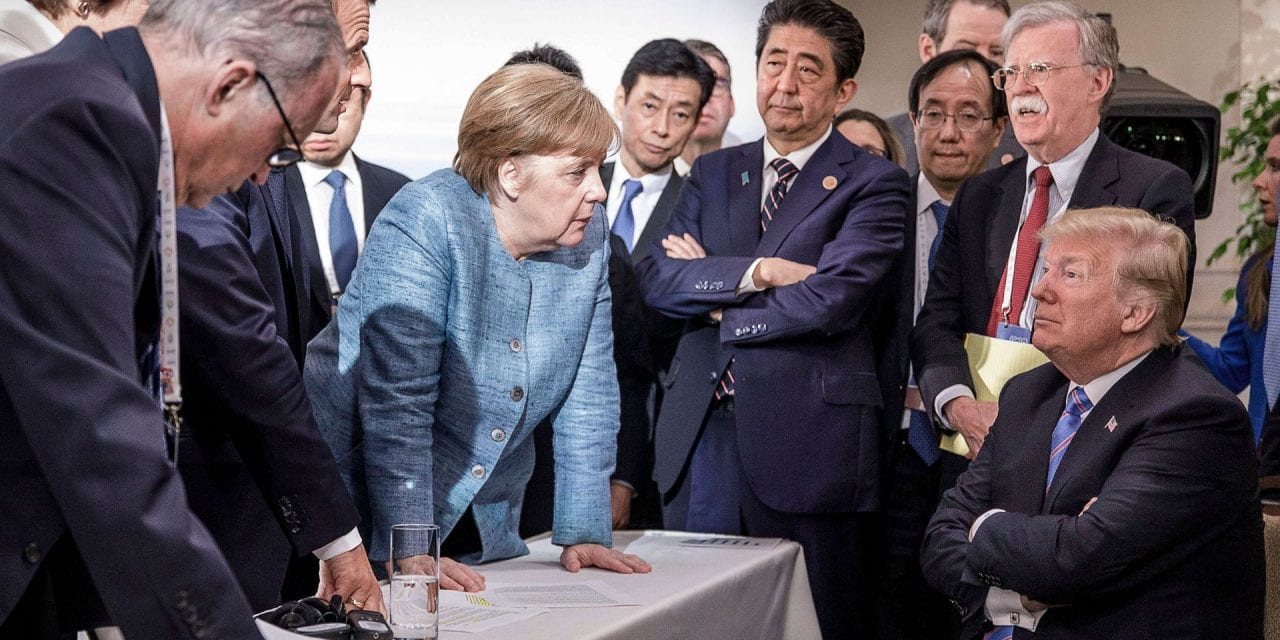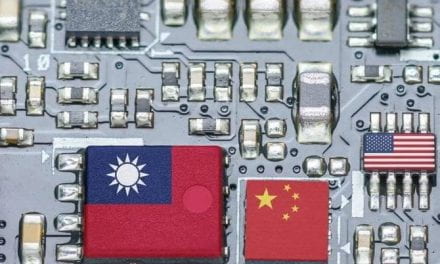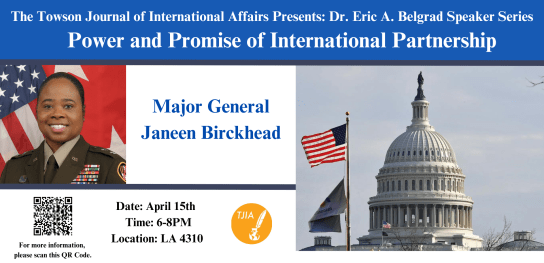The New Cold War
The Cold War reached its flashpoint with the development of nuclear weapons, and the new Cold War is no different. The rules may have changed, but the game is still much the same. SR-71 and U-2 spy planes have been replaced with unmanned drones, and espionage has found refuge in the keystrokes of computers, rather than in field agents and directional microphones. As technology continues to advance, the most-connected country will also be the best protected. Isolationism is a pipe dream in an ever-growing and increasingly interdependent world.
Over the last fifty years, China has altered its national interest to embrace the goal of surpassing the United States as the global leader in technological achievement and innovation. In order for this to be realized, China’s economic model has shifted towards investing heavily in higher education and R&D. China’s investment in education has produced 4.7 million STEM graduates, dwarfing the 568,000 boasted by the United States.[1] Furthermore, China has changed its business policies in certain regions to attract foreign direct investment, further catalyzing progress. These regions, known as Economic and Technological Development Zones (ETDZ), are typically underdeveloped prior to investment. To incentivize development, foreign companies receive tax breaks and subsidies from the Chinese government.[2] Factories are built and the labor force increases, leading to increased economic activity and eventually, growth. When considering China’s stable GDP growth rate of 6.1%, the effectiveness of these zones is hard to repudiate.[3] Thirty years ago, the world was focused on what would happen if China became a superpower. Today, the focus must be on making sure the hatches are battened down for China’s inevitable emergence. For a superpower still clinging to the post-war industrial boom, the confluence of technology and policy has presented an arcane playing field. Rather than combustion engines and factories, the trajectory of the next generation will be mapped by quantum processors and microchips. In order for the primacy of an empire of liberty to persevere in a rapidly evolving landscape, our commitment to established alliances must be unwavering. No superpower willingly capitulates to another.
A Changing World
Our society is progressive, constantly striving to outdo what was done yesterday. The latest innovation in cellular technology, known as 5G, can handle ten times the number of devices and provide speeds one hundred times faster than its predecessor, 4G. Though not yet the global standard, it seems assured that it will be prevalent at the household level in the near future. Several nations, like the United States, Japan, and Germany, have rolled out 5G service, and countries that do not will soon be behind the curve.[4]
As 5G continues to spread across borders, competition grows fierce, and with government contracts worth tens of billions of dollars, it’s understandable that telecommunications companies are stumbling over themselves to receive bids. Earlier this year, the European Union announced a “set of comprehensive measures for an EU-coordinated approach to secure 5G networks.” Included in this approach is a “multi-vendor strategy to avoid or limit any major dependency on a single supplier.”[5] In late January, the European Commission endorsed the plan, which lists telecom giant Huawei, a Chinese company, as an approved supplier.[6] Because member states are required to use multiple suppliers, Huawei is likely to play a crucial role in developing the European 5G network. Huawei will also work with the United Kingdom (UK) to build and develop a 5G network, though their market share will be limited to 35% of non-sensitive areas (no military bases, government facilities, etc.).[7]
Clear and Present?
The announcements from the EU, EC, and the UK are in contrast to the sentiment of the United States, which has taken an aggressive position against the company. In a POLITICO op-ed, Secretary of State Mike Pompeo wrote “with 5G capabilities, the CCP [China] could use Huawei or ZTE’s [Chinese telecom company] access to steal private or proprietary information.”[8] Senator Tom Cotton (R-AR) has also voiced his displeasure at the decision, tweeting “Huawei can deny all it wants, but the evidence is clear: Huawei is a Chinese spy company.”[9] Senator Cotton has gone further by introducing a bill that would “prohibit the United States from sharing intelligence with countries that allow Huawei to operate their 5G networks.”[10]
The Trump administration in particular has taken a strong position against Huawei, which has been embroiled in numerous political controversies and espionage allegations—last year, federal prosecutors indicted the company on thirteen counts of fraud.[11] In May 2019, President Trump issued an executive order aiming to “protect America from foreign adversaries who create and exploit vulnerabilities in information and communications technology infrastructure and services.” Although Huawei is not explicitly mentioned, the order effectively bans US companies from doing business with the telecom giant, unless given approval by the Secretary of Commerce.[12] In mid-February 2020, former acting White House Chief of Staff Mick Mulvaney spoke to an audience in Oxford and warned of a “direct and dramatic” impact on the current intelligence-sharing dynamic between the United States and the UK. Mulvaney stated that if the UK were to allow Huawei to supply necessary 5G infrastructure, the integrity of the intelligence stored within the UK network could be compromised.[13] The security concerns associated with Huawei are clearly a priority for the Trump administration, but efforts to induce allies to adopt a similar attitude have been unsuccessful.
Waning Influence
When discussing a French 5G push, President Emmanuel Macron said “our perspective is not to block Huawei or any company.”[14] German Chancellor Angela Merkel has called for airtight network security, but doesn’t believe a ban is necessary, saying “I tend to trust ourselves to define high security standards, higher than 4G…but not to shut out vendors from the beginning.”[15] Microsoft president Brad Smith agreed that governments should address national security issues, but “it would be a mistake at the same time to try to draw some new digital iron curtain down the Pacific Ocean—I think it would hold back the United States, and would hold back the democracies of the world.”[16] Prime Minister Johnson’s decision is a blow to the Trump administration’s campaign against Huawei. Rather than standing hand-in-hand with our allies on the world stage, it seems as if America has been left to call plays from the bleachers.
The United States’ position on this matter is clear, and it has been expressed strongly across the globe. In a changing political and economic landscape, the “with us or against us” approach from the Cold War is hardly apposite. Linking to a New York Times article about the UK’s decision, Senator Chris Murphy (D-CT) tweeted “America has never been weaker. We have never had less influence. Not even our closest ally Britain, with a Trump soulmate in Downing Street, listens to us anymore.”[17] This game of tug-of-war must make us reconsider where America stands globally, and recognize how we ended up here.
A Roadmap to Isolation
In the international system, the importance of friends, or at the very least, the absence of adversaries, cannot be underscored enough. Since taking office, President Trump has handled the presidency in a manner that can be described only as unorthodox. President Trump’s unorthodoxy pops out in TV interviews, state dinners, and interactions with other heads of state. While some cannot get enough of the “shake-up” that his boisterous persona brings to the world stage, in others, it instills trepidation. According to a 2019 Pew Research Center survey covering 32 countries, only 29% responded that they were confident in President Trump, with 64% saying they “do not have confidence in Trump to do the right thing in world affairs”.
Other world leaders (confidence/no confidence) covered by the survey included Angela Merkel (46%/29%), Emmanuel Macron (41%/36%), Xi Jinping (28%/43%), and Vladimir Putin (33%/57%).[18] This is an improvement from last year’s survey, in which President Trump ranked lowest in confidence and highest in no confidence among a group of leaders that included those mentioned above. To reinforce the shearing of global support suggested by these polls, a 2016 Pew survey across 24 countries reported a 74% confidence rating in President Barack Obama. In 2016, America’s favorability rating was nearly 65%, declining to under 50% in 2017 and hovering around 53% today.[19] In the span of one year (2016–2017), global confidence in the President of the United States dropped by 45%, and America’s favorability rating fell by over 15%.
From 1789 to 2017, Presidents have brought their personalities into the office, resulting in 45 unique approaches to the presidency. Ronald Reagan brought wit earned only by a career in Hollywood, and Calvin Coolidge slept up to fifteen hours a day, using the other nine to be President. Unorthodoxy is not necessarily bad, and it can be argued that no standard presidential attitude exists. While personality indeed shapes the approach to an executive tenure, the duties, expectations, and gravity of the office of President of the United States transcend the character of its incumbent. The President must embody the values of the United States. The collective interest of over 300 million Americans is expressed through a single individual, whose actions and words carry weight like no other. “Ich bin ein Berliner” — with just four words, President John F. Kennedy reignited the solidarity of democracies and solidified our opposition to the Soviet Union. In the Gettysburg Address, President Abraham Lincoln outlined a new path forward for America using only 272. These words provided an effective medium for our founding fathers to cultivate a superpower, and they have helped secure our position in the world today. It was the words of the President that calmed our nation after Pearl Harbor and undeniably united us after 9/11; in contrast, the incumbent has decreed a scorched-earth policy via Twitter.
Alienating Allies
When asked in July 2018 to identify his biggest foe globally, President Trump responded with “Well, I think we have a lot of foes, I think the European Union is a foe”.[20] The EU comprises 27 nation-states and is committed to pursuing common economic and political goals through cooperation. Member states include Germany, France, Italy, and Spain. To call our allies foes is not only regressive but also serves to degrade relations with crucial partners. In June 2018, Canada hosted the G7 summit, which President Trump attended. After departing the G7 meeting early for a summit with North Korean leader Kim Jong-Un in Singapore, President Trump tweeted “PM Justin Trudeau of Canada acted so meek and mild during our @G7 meetings”, going on to call him “very dishonest & weak.”[21] In a phone call with Prime Minister Johnson regarding the Huawei decision, President Trump was apoplectic, ending the call by slamming the phone down. Prime Minister Johnson was scheduled to visit Washington, DC in January but the meeting was repeatedly postponed, finally being slated for March. A week after the phone call between the two leaders, Johnson cancelled the trip entirely, and will not visit the United States until the June G7 summit.[22]
On February 10th 2020, at a conference with the nation’s governors, President Trump said he believed the “European Union was really formed so they could treat us badly.”[23] The idea of a unified Europe entered the global discourse in 1946, when Winston Churchill called for a United States of Europe. Following WWII, the need for a sense of cohesion and stability among European nations was realized. While not reified until the Maastricht Treaty (1992), the principle of a unified front continued to influence treaties and economic agreements during the interim. While the EU aims to promote peace, protect freedoms, and combat discrimination, its plethora of goals can be distilled down to one, “enhancing economic, social, and territorial cohesion and solidarity among EU countries.”[24] The EU was born from the ashes of a world aflame, built from the ground up to ensure that the atrocities committed during the war were not repeated. Cooperation between states to achieve virtuous ends is something to be celebrated, not attacked. When President Trump says he believes the EU is working to undermine American interests, he is not only breeding contempt for our allies with his supporters, he is also telling world leaders that cooperation is antithetical to the values of the United States. If President Trump says that our allies are actively working to hurt our nation, does it come as a surprise when those same allies rebuff his efforts to control their domestic policies?
Courting Foes
Demeaning our partners is not the only aspect of the President’s aberrant manner that raises red flags, his unusual affinity for our foes does as well. In September 2018, at a rally in West Virginia, President Trump discussed correspondence with Kim Jong-Un, saying “I was really being tough and so was he. We would go back and forth. And then we fell in love, okay? No really, he wrote me beautiful letters, and they’re great letters.”[25] The remarks came after the two heads of state met to discuss North Korean denuclearization, but to this day little, if any, substantive progress has been made. Ignoring the fact that our founding fathers would shudder at the thought of cozying up to a dictatorship, this attitude glosses over the rampant brutality of the Un regime and is simply not presidential.
At the same February meeting where he questioned the motives of the EU, President Trump commended China’s use of the death penalty for drug crimes. According to the President, countries like China that have “fair but quick trials” also “have very little, if any drug problem.”[26] President Trump’s stated correlation, which is not the same as causation, falls short as an analysis of the impartiality of the Chinese judicial system. According to the World Justice Project’s Rule-of-Law index, China ranks 82/126 overall, 57th in criminal justice, 121st in fundamental rights, and 119th in constraints on government powers. In comparison, the United States ranks 20/126 overall, 23rd in criminal justice, 27th in fundamental rights, and 19th in constraints on government powers.[27] Praising the dawdling criminal justice system of a nation whose government is hell-bent on denying its citizens rights is an affront to the US Constitution, the document that guarantees due process and prohibits cruel and unusual punishment. While President Trump may see the death penalty as a deterrent to drug-related crimes, the 2007 resolution of the UN General Assembly placing a moratorium on the death penalty shows that other nations do not agree. Statements such as these widen the already cavernous divide between us and the rest of the world, placing us dangerously close to nations who see the United States as a legitimate threat to the advancement of their ideals, many of which cannot be referred to as virtuous.
President Trump has made a habit of approaching the nations of the world much how a businessman would approach a potential investor. Come in strong, shake them down for whatever you can, and make a deal, no matter what. The impact of a headline takes priority over substance. Again, while his bombastic rhetoric and boardroom tactics may rev up his base, they have a somewhat different effect globally. Worldwide, America’s favorability rating has decreased considerably. In terms of global confidence, the current President ranks lower than Vladimir Putin and only one percent higher than Xi Jinping, who, after China’s recent repeal of the law mandating term limits, can effectively hold his office for life.
Reversing Course
As the world advances rapidly, both technologically and economically, the reality of an emerging superpower cannot be ignored. For the United States to remain the principal driver of global policy, the rest of the world must believe we are willing to step up to the plate. The sentiments of our founding fathers and allies are not espoused by dictatorial or authoritarian regimes. Succumbing to leaders or beliefs incompatible with democracy does not bode well for America’s status as de facto leader of the free world. When adversaries of democracy can expect preferential treatment over admonition, the confidence of our allies and other like-minded nations in our commitment to life, liberty, and the pursuit of happiness has been undermined.
In late December of 1940, President Roosevelt spoke to the nation, saying that in order to ensure the persistence of freedom in a tumultuous world, “We must be the great arsenal of democracy.”[28] While the ethos of the fireside chat era is timeless, it must be contemporarily applied. The last twenty years have produced incredible technological progress in all fields: medicine, personal computing, microtechnology, and defense. A string of code can cripple a nation’s economy and annihilate its infrastructure; we are no longer in the campaign age of warfare. Combat readiness is a useful metric when battles are fought by boots on the ground, but Harrier jets and Abrams tanks can do little against a cyber-attack. Our national interests are closely tied to our technology, as is her security. Laws will forever change in language and interpretation, and power will continue to spread across all latitudes. Vigilance will aid us moving forward, but failure to recognize and counter a clear-and-present danger will prove catastrophic.
The desire for ideals to transcend borders is shared by many nations, and so the view that countries such as Russia and China do not have the same mentality is myopic. Those nations will not take their foot off the accelerator, and should the United States regress, we will be overtaken. If America wishes to continue to hold high ideals and aim towards noble ends, we must strengthen our bonds with nations sharing similar aspirations and stand strong against those that wish us harm. Being an American is emphatically not about blind faith and unwavering support. Americans who wish to see our ideals an ocean away must acknowledge when our sails are turned against the prevailing winds, and be committed to charting a new course.
- “Measuring Human Capital.” Human Capital Report 2016.
http://reports.weforum.org/human-capital-report-2016/measuring-human-capital/.
- Howell, Anthony. “Heterogeneous Impacts of China’s Economic and Development Zone
Program.” Journal of Regional Science 59, no. 5 (2019): 797-818.
- “GDP Growth (Annual %) – China, India | Data – World Bank.”
https://data.worldbank.org/indicator/NY.GDP.MKTP.KD.ZG?locations=CN-IN.
- West, Darrell M. “How 5G technology enables the health internet of things.” Brookings
Center for Technology Innovation 3 (2016): 1-20.
- “Cybersecurity of 5G Networks – EU Toolbox of Risk Mitigating
Measures.” Shaping Europe’s digital future – European Commission, January 31, 2020. https://ec.europa.eu/digital-single-market/en/news/cybersecurity-5g-networks-eu-toolbox-risk-mitigating-measures.
- “Press Corner.” European Commission – European Commission.
https://ec.europa.eu/commission/presscorner/detail/en/ip_20_123.
- Chappell, Bill. “U.K. Will Allow Huawei To Build Part Of Its 5G Network, Despite U.S.
Pressure.” NPR. NPR, January 28, 2020. https://www.npr.org/2020/01/28/800377277/u-k-will-allow-huawei-to-be-part-of-its-5g-network.
- Pompeo, Michael R. “Europe Must Put Security First with 5G.” POLITICO. POLITICO,
December 2, 2019. https://www.politico.eu/article/europe-must-put-security-first-with-5g-mike-pompeo-eu-us-china/.
- Cotton, Tom. “Huawei Can Deny All It Wants, but the Evidence Is Clear: Huawei Is a
Chinese Spy Company. Every Nation That Values Its Security and Independence Ought to Block Huawei from Its 5G Networks.https://T.co/WWtnI6U96l.” Twitter. Twitter, February 3, 2020. https://twitter.com/SenTomCotton/status/1224401169847660544
- “Cotton Introduces Bill Banning Intelligence Sharing With Countries Using Huawei.”
Tom Cotton | U.S. Senator for Arkansas, January 8, 2020. https://www.cotton.senate.gov/?p=press_release&id=1288.
- “Chinese Telecommunications Conglomerate Huawei and Subsidiaries Charged in
Racketeering Conspiracy and Conspiracy to Steal Trade Secrets.” The United States Department of Justice, February 13, 2020. https://www.justice.gov/opa/pr/chinese-telecommunications-conglomerate-huawei-and-subsidiaries-charged-racketeering.
- “Executive Order on Securing the Information and Communications Technology and
Services Supply Chain.” The White House. The United States Government.. https://www.whitehouse.gov/presidential-actions/executive-order-securing-information-communications-technology-services-supply-chain/.
- Sabbagh, Dan. “US ‘Very Concerned’ over Huawei’s Role in UK 5G Network.” The
Guardian. Guardian News and Media, February 19, 2020. https://www.theguardian.com/technology/2020/feb/19/us-very-concerned-over-huaweis-role-in-uk-5g-network.
- “Macron on Huawei: Not Looking to Stigmatize Any Particular Firm or Country.”
Reuters. Thomson Reuters, November 28, 2019. https://www.reuters.com/article/us-france-huawei/macron-on-huawei-not-looking-to-stigmatize-any-particular-firm-or-country-idUSKBN1Y21FG.
- Bloomberg.com. Bloomberg.
- Kelion, Leo. “Huawei: Microsoft President Seeks End to US Tech Ban.” BBC News.
BBC, September 19, 2019. https://www.bbc.com/news/technology-49753460.
- Murphy, Chris. “America Has Never Been Weaker. We Have Never Had Less Influence.
Not Even Our Closest Ally Britain, with a Trump Soulmate in Downing Street, Listens to Us Anymore. Https://T.co/yvM1ZORtgS via @NYTimes.” Twitter. Twitter, January 28, 2020. https://twitter.com/ChrisMurphyCT/status/1222148235424387072.
- Wike, Richard, Jacob Poushter, Janell Fetterolf, and Shannon Schumacher. “Trump
Ratings Remain Low Around the World, While Views of U.S. Stay Mostly Favorable.” Pew Research Center’s Global Attitudes Project. Pew Research Center, February 11, 2020. https://www.pewresearch.org/global/2020/01/08/trump-ratings-remain-low-around-globe-while-views-of-u-s-stay-mostly-favorable/.
- Poushter, Jacob. “How People around the World See the U.S. and Donald Trump in 10
Charts.” Pew Research Center. Pew Research Center, January 8, 2020. https://www.pewresearch.org/fact-tank/2020/01/08/how-people-around-the-world-see-the-u-s-and-donald-trump-in-10-charts/.
- “‘I Think the European Union Is a Foe,” Trump Says Ahead of Putin Meeting in
Helsinki.” CBS News. CBS Interactive, July 15, 2018. https://www.cbsnews.com/news/donald-trump-interview-cbs-news-european-union-is-a-foe-ahead-of-putin-meeting-in-helsinki-jeff-glor.
- Trump, Donald J. “PM Justin Trudeau of Canada Acted so Meek and Mild during Our
@G7 Meetings Only to Give a News Conference after I Left Saying That, ‘US Tariffs Were Kind of Insulting’ and He ‘Will Not Be Pushed around.” Very Dishonest & Weak. Our Tariffs Are in Response to His of 270% on Dairy!” Twitter. Twitter, June 9, 2018. https://twitter.com/realdonaldtrump/status/1005586562959093760.
- Bienkov, Adam. “Boris Johnson Has Canceled His Planned Trip to the White House after
Trump Slammed the Phone down on Him in a Moment of ‘Apoplectic’ Fury.” Business Insider. Business Insider, February 15, 2020. https://www.businessinsider.com/boris-johnson-cancels-visit-donald-trump-slammed-phone-down-apoplectic-2020-2.
- O’Donnell, Tim. “Trump Claims EU Was Formed so Member States Could Treat U.S.
‘Badly’.” The Week – All you need to know about everything that matters. The Week, February 10, 2020. https://theweek.com/speedreads/895037/trump-claims-eu-formed-member-states-could-treat-badly.
- “The EU in Brief.” European Union, March 31, 2020.
https://europa.eu/european-union/about-eu/eu-in-brief_en.
- Manchester, Julia. “Trump’s Comments on Falling in Love with Kim Jong Un ‘Shocking
and Appalling,’ Says Conservative Writer.” TheHill, October 1, 2018. https://thehill.com/hilltv/rising/409245-trumps-comments-on-falling-in-love-with-kim-jong-un-are-shocking-and-appalling.
- Slisco, Aila. “Trump Praises China’s ‘Powerful Death Penalty’ for Drug Dealers, Says
He’s Unsure If America’s ‘Ready for That.’” Newsweek. Newsweek, February 10, 2020. https://www.newsweek.com/trump-praises-chinas-powerful-death-penalty-drug-dealers-says-hes-unsure-if-americas-ready-1486604.
- “Research and Data.” World Justice Project.
https://worldjusticeproject.org/our-work/wjp-rule-law-index.
- Eidenmuller, Michael E. American Rhetoric: Franklin Delano Roosevelt – “The Arsenal
Of Democracy”.
https://americanrhetoric.com/speeches/fdrarsenalofdemocracy.html.







